42 dancing raisins experiment worksheet
Simple Science Experiment: The Dancing Raisins Raisins in this mixture will sit at the bottom at first, and then as the bubbles collect on the sides of the fruit, they will begin to float. When they reach the top, the bubbles on the raisins pop and the raisins sink back down. The cycle will repeat with the raisins going up and down until all of the bubbles are done. PDF Dancing Raisins - LA County Library Dancing Raisins Recommended for Ages 4 - 8 Turn up the music for a fun kitchen chemistry experiment! Materials Clear soda, tall clear glass, 6-10 raisins Instructions 1. Fill the glass halfway full of clear soda. 2. Slowly drop the raisins one at a time into the soda. 3. Observe! What is happening to the raisin? Experiment Explained:
KS1 Dancing Raisin Science Experiment (Teacher-Made) - Twinkl An exciting activity that investigates why an object that normally sinks, floats. Have a look at our Fruit Volcanoes activity for another fruit experiment. Have your children liking the healthy snack even more with this illustrated Raisin Poster. Other resources like this You might also like this Lemon Volcano Experiment.
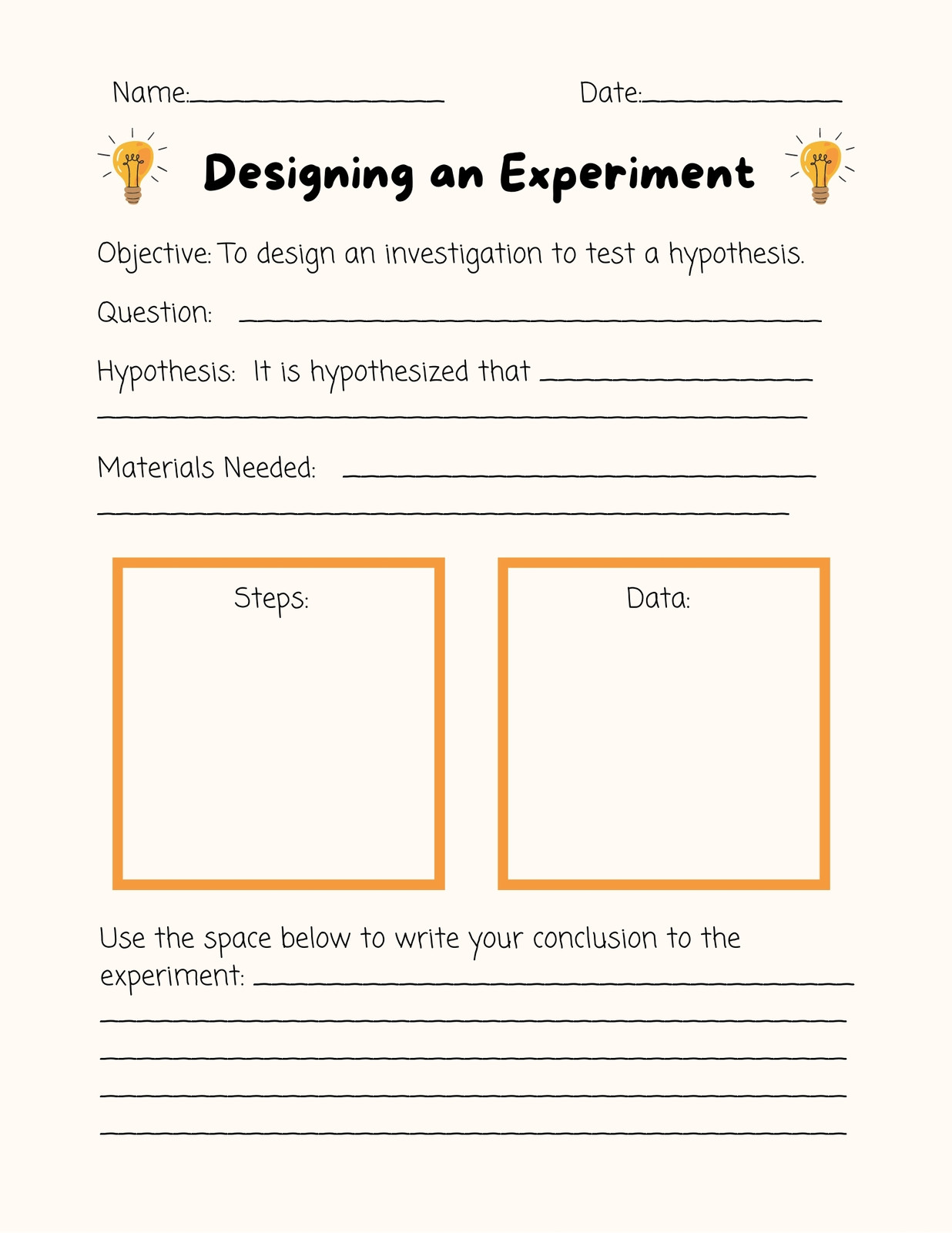
Dancing raisins experiment worksheet
Dancing Raisins Science Experiment for Kids Fill a glass with soda. Drop raisins into the glass. What happens? Do they sink or float? Then sit and watch what happens. You may need to be patient. It can take a minute or two for them to start moving. The kids got a huge kick out of this! They loved watching the raisins get lifted up and then pushed back down in the soda. Dancing Raisins Science Experiment - Cool Science Experiments Headquarters Dancing Raisins Science Experiment Instructions Step 1 - Gather your materials together and begin by pouring the pop into the cup. Pour until it is about 3/4 of the way full. As you are pouring the pop, take a moment to make observations. What did you notice as you poured the pop into the cup? Did you see anything interesting happen? Make a raisin dance - baking soda experiment - Science Experiments for Kids Instructions Fill the glass half full with warm water. Add two heaped teaspoons of baking soda. Add a few raisins Put the glass in a tray - it might overflow Top of with white vinegar You should see the raisins begin to rise and fall Why do the raisins dance? The vinegar and bicarbonate of soda react forming carbon dioxide.
Dancing raisins experiment worksheet. dancing raisins experiment worksheet Dancing Raisin Experiment Lesson Plans & Worksheets. 10 Pictures about Dancing Raisin Experiment Lesson Plans & Worksheets : Pin on science, Dancing Raisins Science Experiment and also Dancing Raisins Experiment Worksheet - Escolagersonalvesgui. Dancing Raisin Experiment Lesson Plans & Worksheets raisins raisin PDF Dancing Raisins - sfi.ie Drop a handful of raisins into a jar of freshly opened fizzy drink. After a while the raisins will rise to the surface,sink,rise again,etc.thus dancing up and down. SAFETYCare with liquids FOLLOW-UP ACTIVITYWeigh the raisins before and after the activity. Do you notice anything? Can you explain? Dancing Raisin Experiment Lesson Plans & Worksheets Dancing Raisins - The Bubble Lifter For Teachers 4th - 8th Here is an engaging demonstration of density that you can do with your young physical scientists. Place different rough surfaced objects into carbonated liquid. The carbon dioxide bubbles collect on the surface of the objects and... + Lesson Planet: Curated OER The Dancing Raisins Experiment : 4 Steps (with Pictures) - Instructables Step 1: How It Works. It is actually pretty simple how this experiment works. Because of the reaction between the baking soda and vinegar, carbon dioxide is created. The CO2 creates bubbles on the ridges on the raisins, which increases its buoyancy, causing it to float. But when the raisins get to the top, the bubbles pop, causing them to sink ...
Dancing Raisins Experiment - scifun.org You can use the carbon dioxide fizz from a soft drink to make raisins dance. For this experiment you will need: a can of colorless soda (e.g., 7-Up or Sprite) a tall, clear glass or plastic cup. several raisins (fresh raisins work the best) Pour the can of soda into the tall glass. Notice the bubbles coming up from the bottom of the glass. PDF Dancing Raisins - Super Teacher Worksheets Raisins have more density than the 7-Up, so they sink to the bottom. But the carbon dioxide air bubbles stick to the surface of the raisin as they rise up through the liquid. When they stick to a raisin, they give it extra buoyancy, causing it to float to the top. When the bubbles detach from the raisin, it sinks again. Dancing Raisins Science Experiment - Buggy and Buddy We absolutely love science experiments and projects here! They are such a great way to build on children's natural curiosity and encourage critical thinking. This dancing raisins science experiment was one of Lucy and Theo's favorites!. Follow our Science for Kids Pinterest board for even more ideas!. Check out even more science activities in the video below! KS1 Dancing Raisin Science Experiment (teacher made) - Twinkl KS1 Dancing Raisin Science Experiment (teacher made) Home Learning. Curriculum Aims. Remote Learning. Nature of Science and Technology Science Activities Science and Inventions (Ages 5 - 7) 実験遊び/ Science Awe and Wonder. Unlimited Premium.
15 Dancing Raisins Experiment ideas | preschool science, dancing ... Jun 26, 2017 - Explore samantha capetillo's board "Dancing Raisins Experiment" on Pinterest. See more ideas about preschool science, dancing raisins experiment, teaching science. Dancing Raisins K-2 - Science Demo Guy Dancing Raisins K-2 $2.50 - Add to Cart Back to K-2 STEM Elementary Classroom Project In this activity students will work in groups while dropping raisins into a clear carbonated drink (7-up or Sprite) and make observations about their dancing raisins. Students will brainstorm why they appear to be dancing, rising, and sinking. Updated July, 2015! Dancing Raisins Experiment: Simple Science Fun! - Blogger The kids were bursting with excitement as they saw our raisins begin to dance! We talked about how the carbonation in the pop is air. The bubbles attach to the rough surface of the raisin. When enough bubbles form, it makes the raisins bouyant and they rise to the top. At the surface, the bubbles pop and the raisins sink again. Dancing Raisins Experiment - Little Bins for Little Hands Comparing several types of sodas would make a great experiment for making predictions. INSTRUCTIONS STEP 1. Fill the glass almost 3/4 full with club soda. STEP 2. Add a small handful of raisins to the soda. STEP 3. Watch what happens to the raisins. You will see them drop to the bottom of the glass, float to the top and back down again.
Dancing raisins experiment - Gift of Curiosity The dancing raisins experiment requires the following materials: Two tall glasses A clear carbonated beverage (e.g., carbonated water or a clear-colored soda) Plain water (e.g., from the tap) A handful of raisins (we used 1/3 cup in each glass) To begin, I filled one glass with water and another glass with our clear, carbonated beverage.
Dancing Raisins Experiment Worksheets & Teaching Resources | TpT 1. $1.25. PDF. Use this handout to guide students through the dancing raisins science experiment by using the scientific method. Place a few raisins in a cup of sprite and watch them dance. Discuss with children the reason why the raisins danced , air bubbles caused by carbonation.Included is the experiment direct.
dancing raisins worksheet - TeachersPayTeachers Worksheets NGSS: MS-PS1-1 Add to cart Wish List Dancing Raisin Experiment by Science and STEAM Team 4.9 (60) $2.50 PDF This is super fun and easy dancing raisins science experiment for elementary grades. This aligns with the Next Generation Science Standards.
The Dancing Raisin Experiment - ThoughtCo The Dancing Raisins Experiment Decide whether you want to use soda or baking soda and vinegar to conduct the experiment or if you want to compare what happens in both versions of the experiment. Note: For the baking soda and vinegar version of the experiment, you'll need to fill the glass halfway with water.
Dancing Raisins Science Experiment with Baking Soda and Vinegar Dancing raisins experiment with baking soda and vinegar First, use your spoon to place about a tablespoon of baking soda into the glass half-filled with water. The exact amount is not important. Dancing raisins science experiment Stir the baking soda until it is dissolved in the water. Dancing raisins experiment explanation
Dancing Raisins | Science Experiment For Kids - Osmo Kids Learning Here is the step-by-step guide to making those yummy raisins dance: Step 1: Fill the glass with ½ cup of water. Step 2: Add 2 teaspoons of baking soda, and stir well until it is completely dissolved. Step 3: Add a few raisins to the glass. Step 4: Then, slowly pour 1 tablespoon of vinegar into the glass and watch raisins dance until they drop!
Dancing raisins printable recording sheets. | Science experiments kids ... Apr 22, 2020 - Dancing raisins printable recording sheets. Pinterest. Today. Explore. ... Science Worksheets. Teaching Science. Science Projects. Preschool Stem. Science Ideas. ... This simple dancing raisins science experiment is super simple and so much fun! It comes with free printable science recording sheets too! #scienceforkids # ...
PDF Dancing Raisins - Discovery World Add the carbonated liquid into a second glass until it is about 1/2 to 3/4 full. Add about 1 tablespoon of the first food item you are testing to the water and add 1 tablespoon to the carbonated liquid. Observe what happens in each glass. Check it again a few minutes later. Draw what you saw on the observation sheet.
940 Top Dancing Raisins Teaching Resources - twinkl.co.uk 940 Top "Dancing Raisins" Teaching Resources curated for you. KS1 Dancing Raisin Science Experiment 4.6 (14 reviews) Raising Raisins PowerPoint. STEMathon - STEM Day Challenges 5.0 (1 review) Rainbow in a Jar PowerPoint 4.7 (7 reviews) Fruity Sweets Science Experiment 4.7 (11 reviews) FREE Resource! Dancing Raisins.
Raisin Experiment - The Activity Mom You may have heard of this Dancing Raisin Experiment, but now it's time to try it. With a few simple ingredients you will have your toddler or preschooler wondering and questioning. Fill a clear bottle or cup with Sprite (or another carbonated, clear beverage) and drop raisins in. Watch what happens to the raisins!
Dancing Raisins Lesson Plans & Worksheets Reviewed by Teachers Dancing Raisins For Students 2nd - 3rd In this science investigation worksheet, students follow the directions to mix raisins in clear carbonated soda to watch them sink and rise. + Lesson Planet: Curated OER Dancing, Through Literature For Teachers 7th - 12th Students combine literature with dance.
Make a raisin dance - baking soda experiment - Science Experiments for Kids Instructions Fill the glass half full with warm water. Add two heaped teaspoons of baking soda. Add a few raisins Put the glass in a tray - it might overflow Top of with white vinegar You should see the raisins begin to rise and fall Why do the raisins dance? The vinegar and bicarbonate of soda react forming carbon dioxide.
Dancing Raisins Science Experiment - Cool Science Experiments Headquarters Dancing Raisins Science Experiment Instructions Step 1 - Gather your materials together and begin by pouring the pop into the cup. Pour until it is about 3/4 of the way full. As you are pouring the pop, take a moment to make observations. What did you notice as you poured the pop into the cup? Did you see anything interesting happen?
Dancing Raisins Science Experiment for Kids Fill a glass with soda. Drop raisins into the glass. What happens? Do they sink or float? Then sit and watch what happens. You may need to be patient. It can take a minute or two for them to start moving. The kids got a huge kick out of this! They loved watching the raisins get lifted up and then pushed back down in the soda.
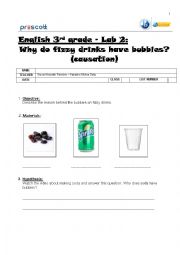

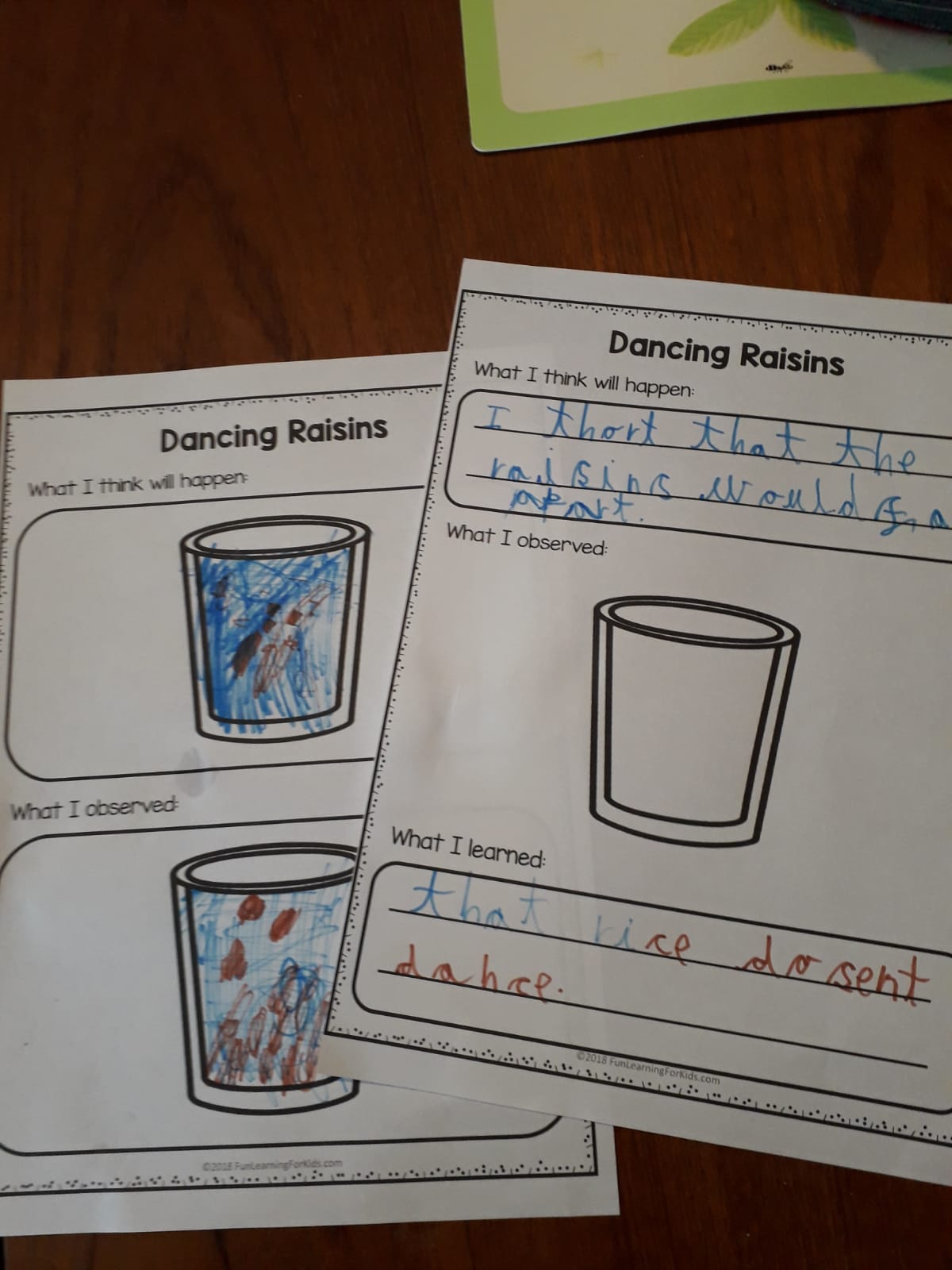
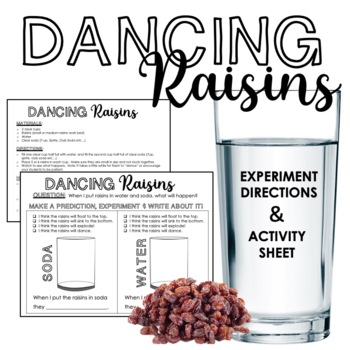
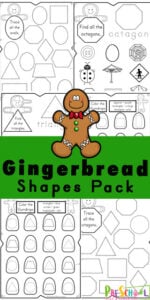
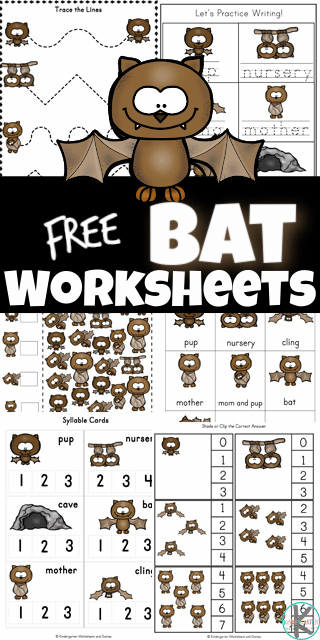
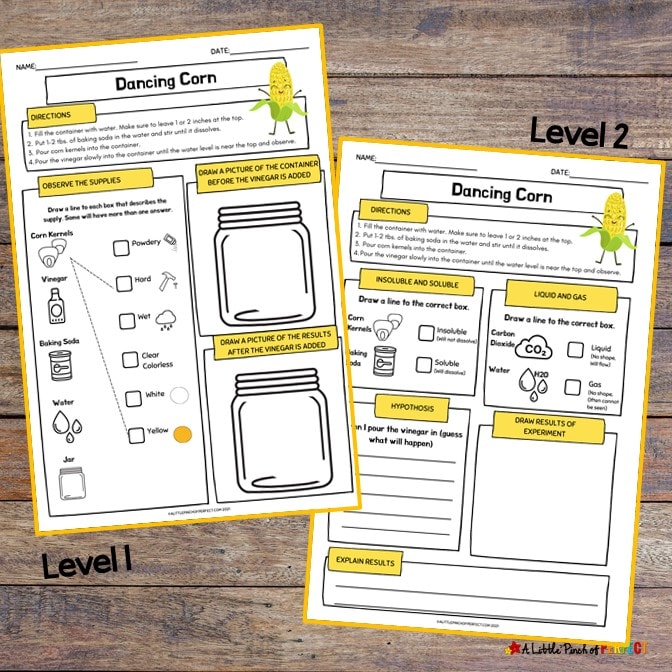
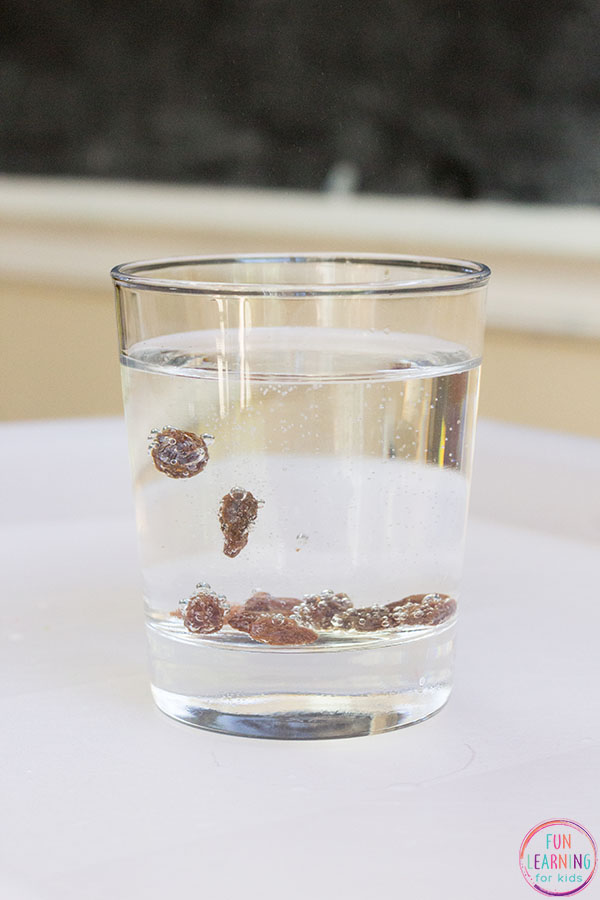
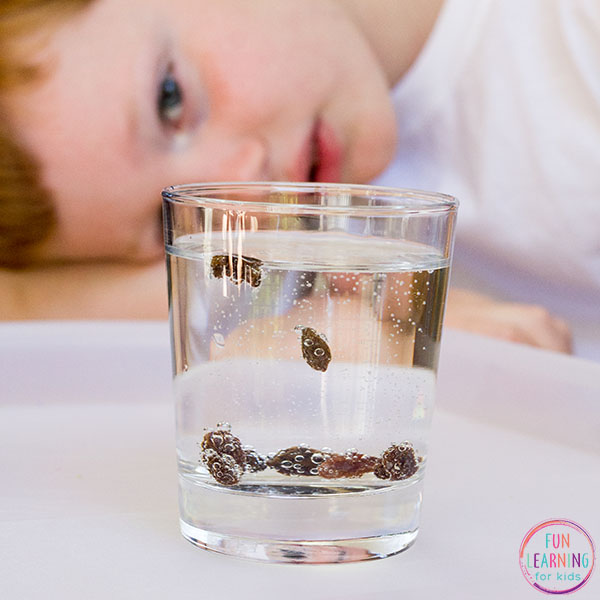
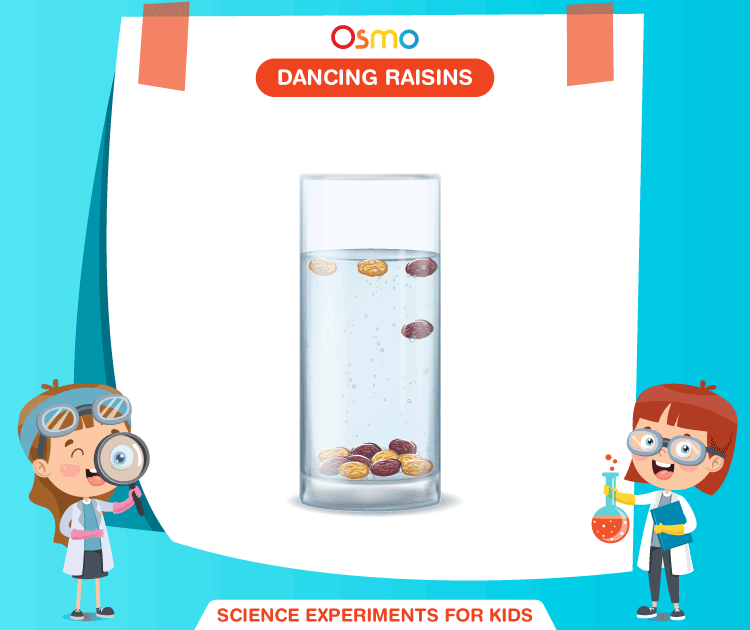
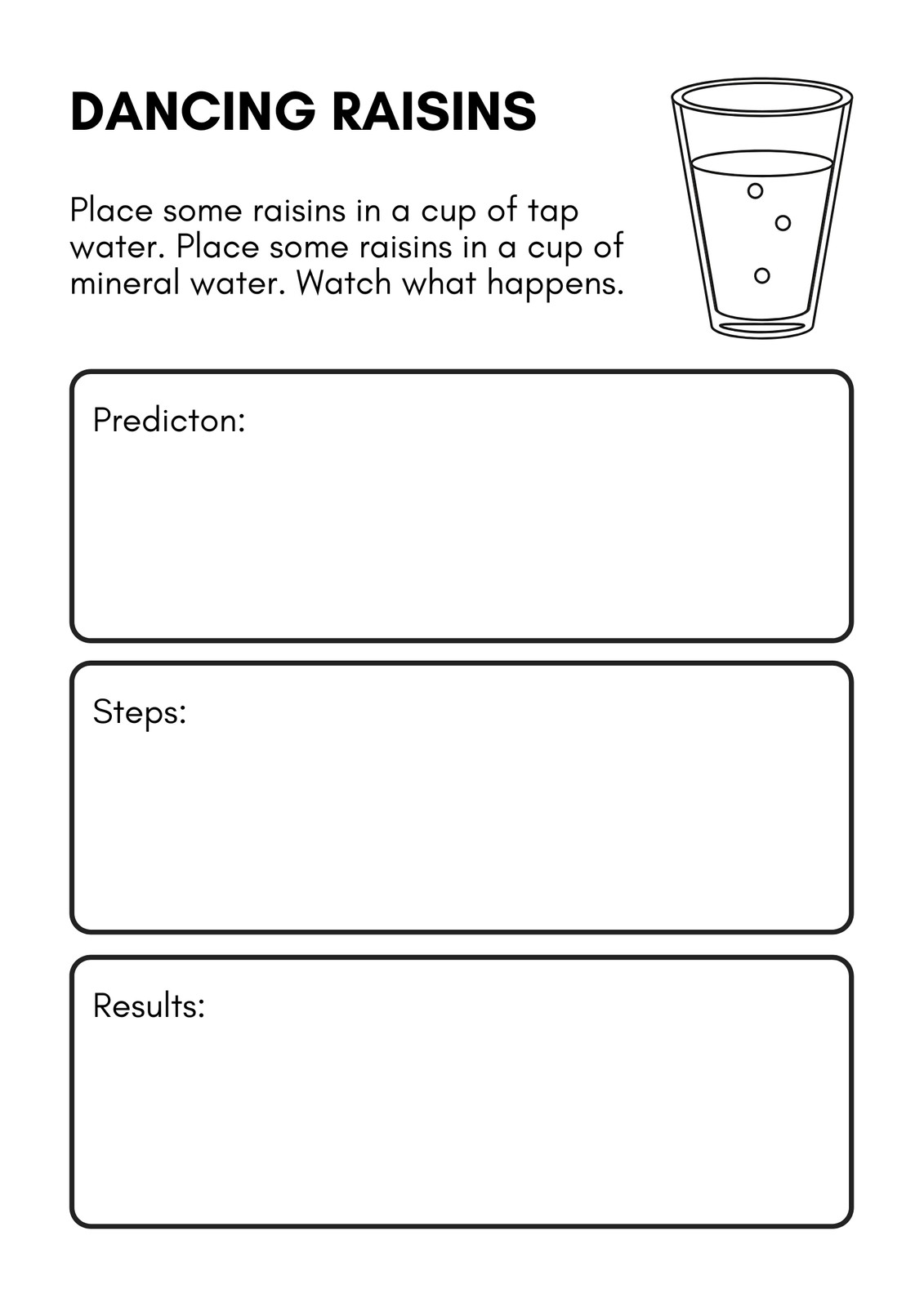

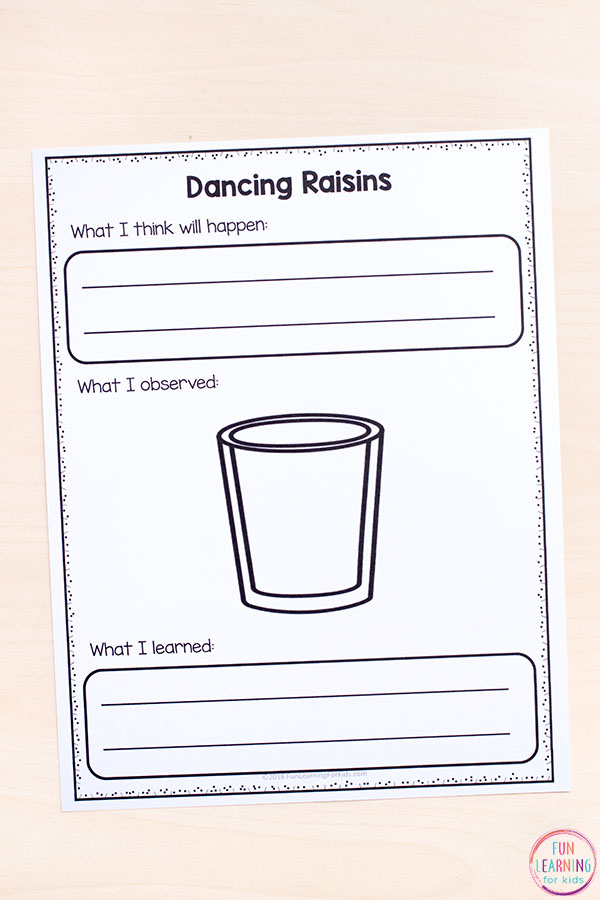
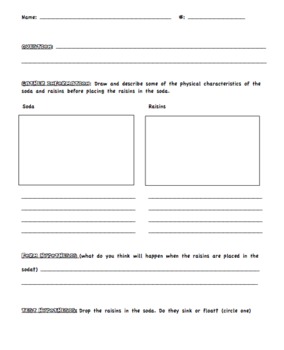




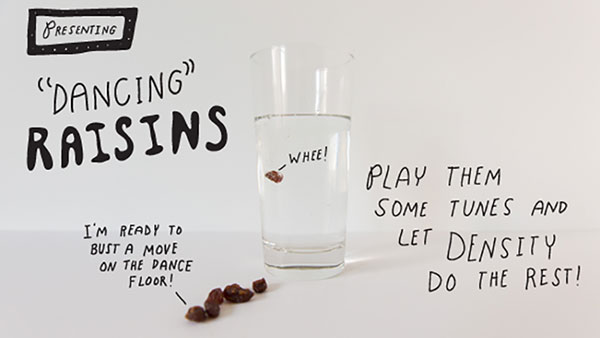
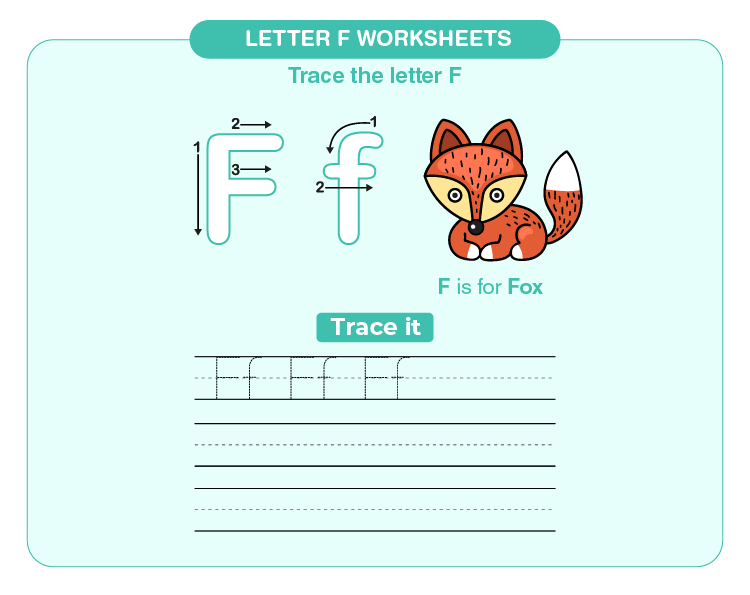

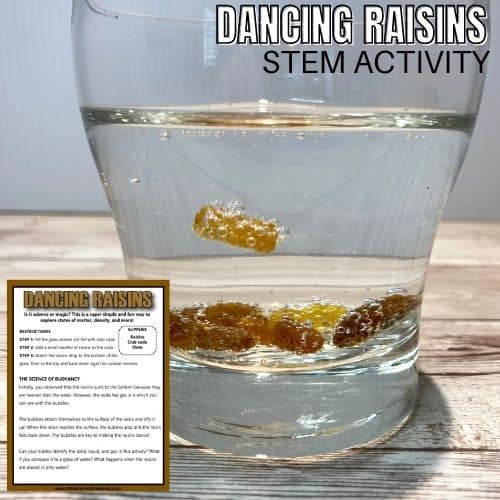

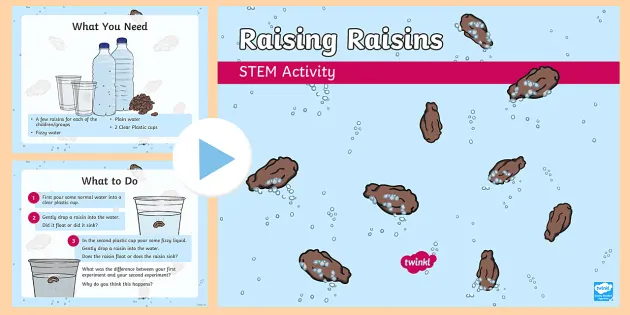
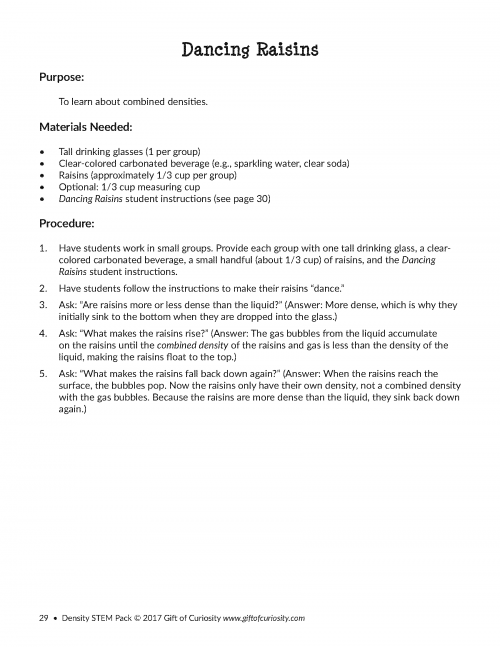

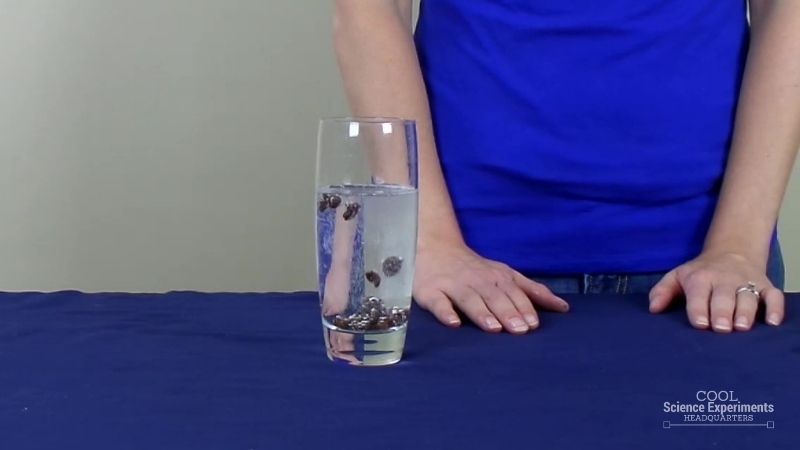
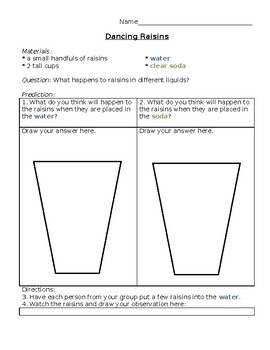

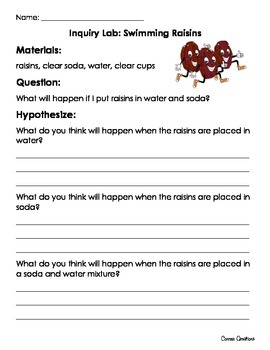

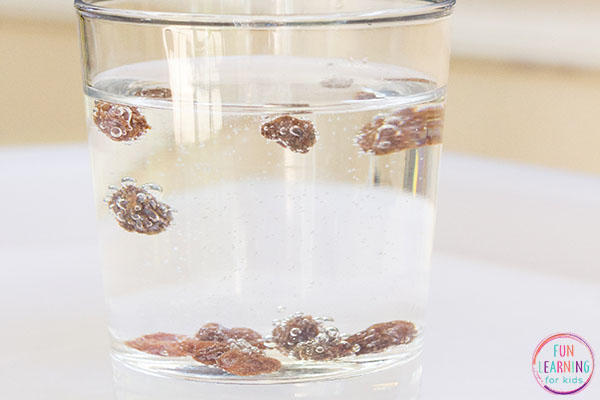
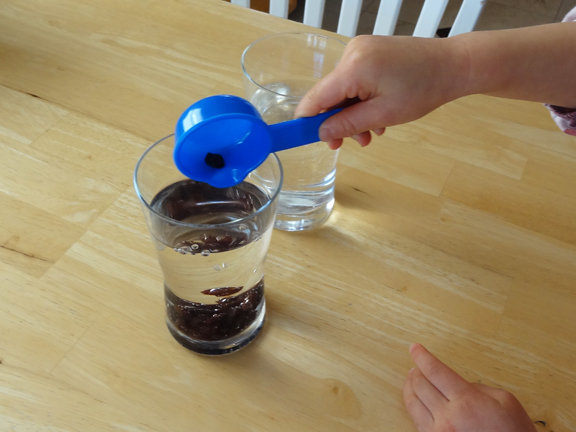
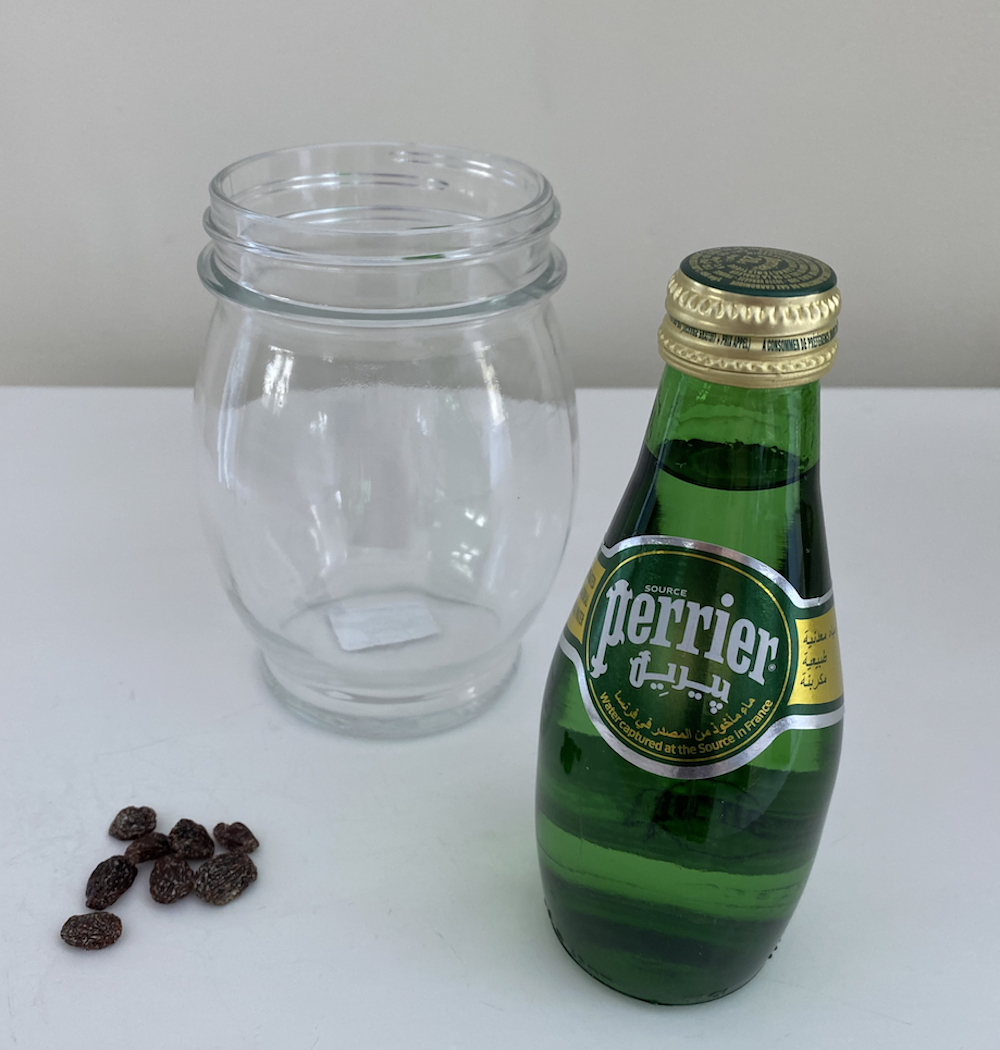
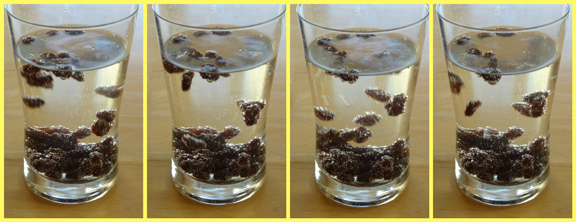
0 Response to "42 dancing raisins experiment worksheet"
Post a Comment